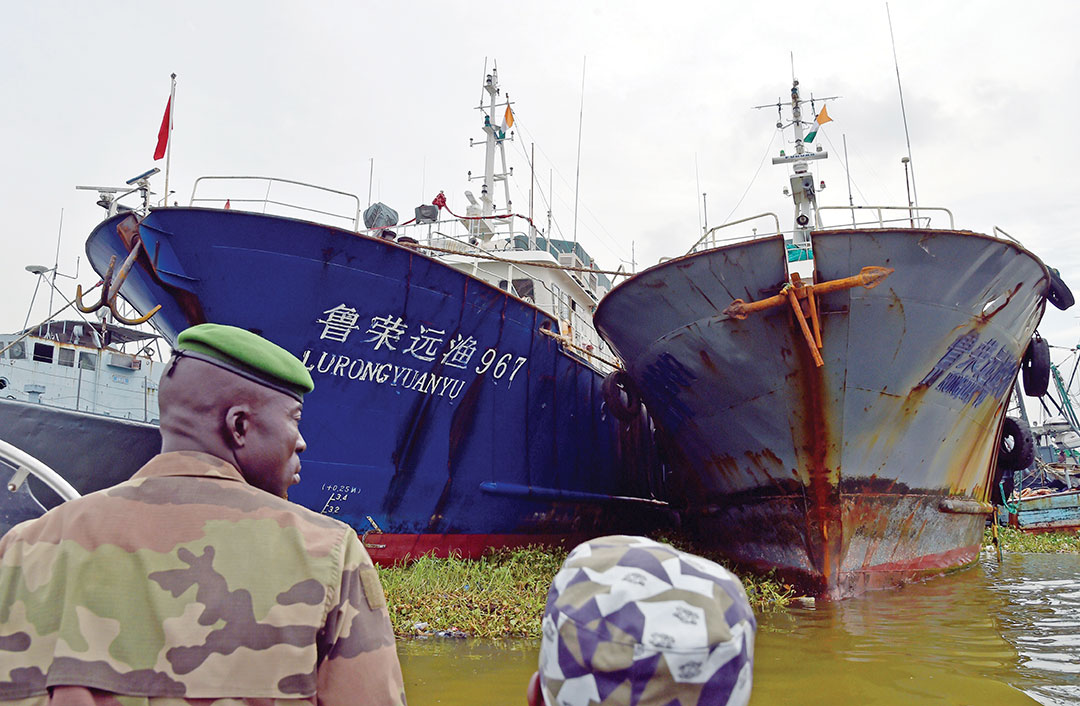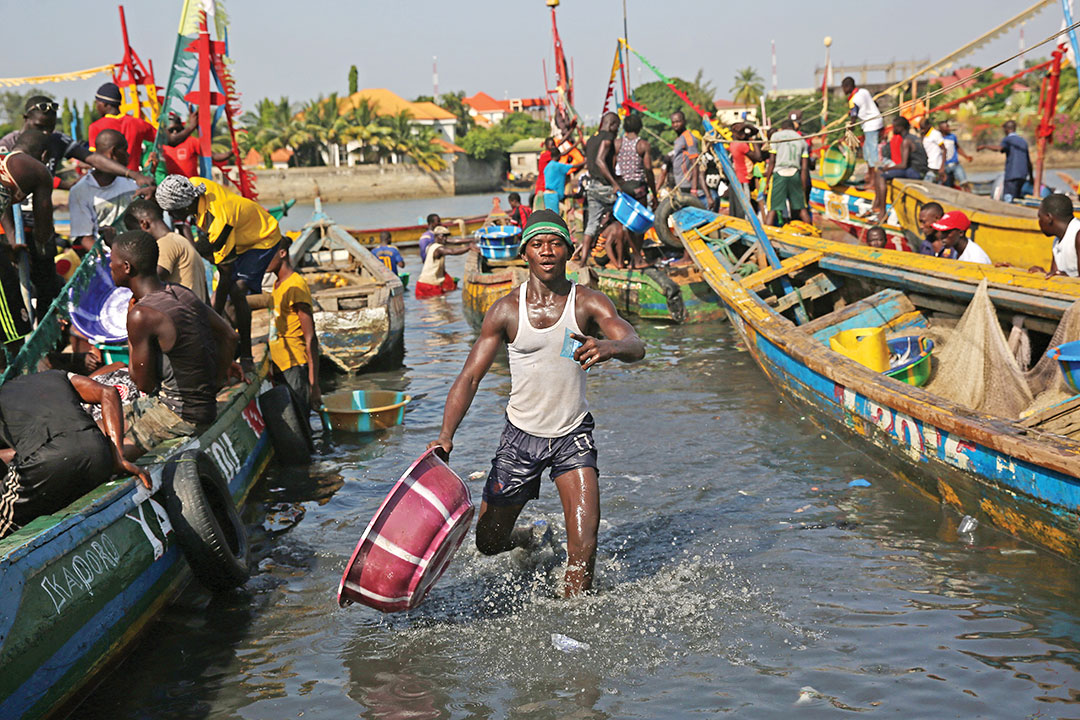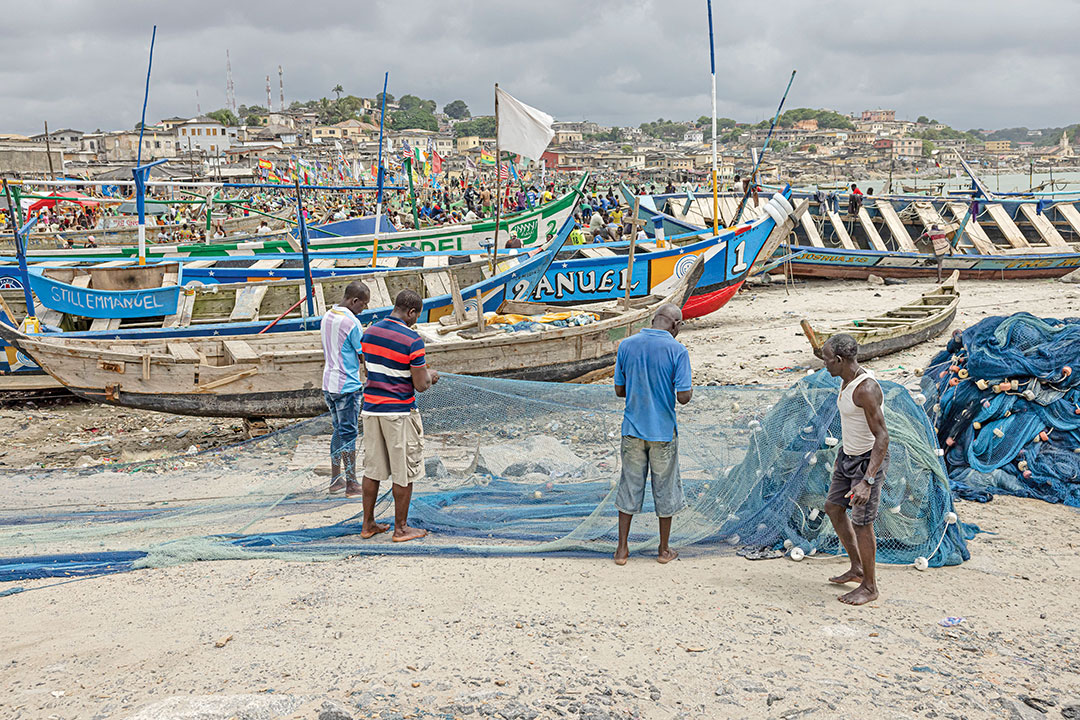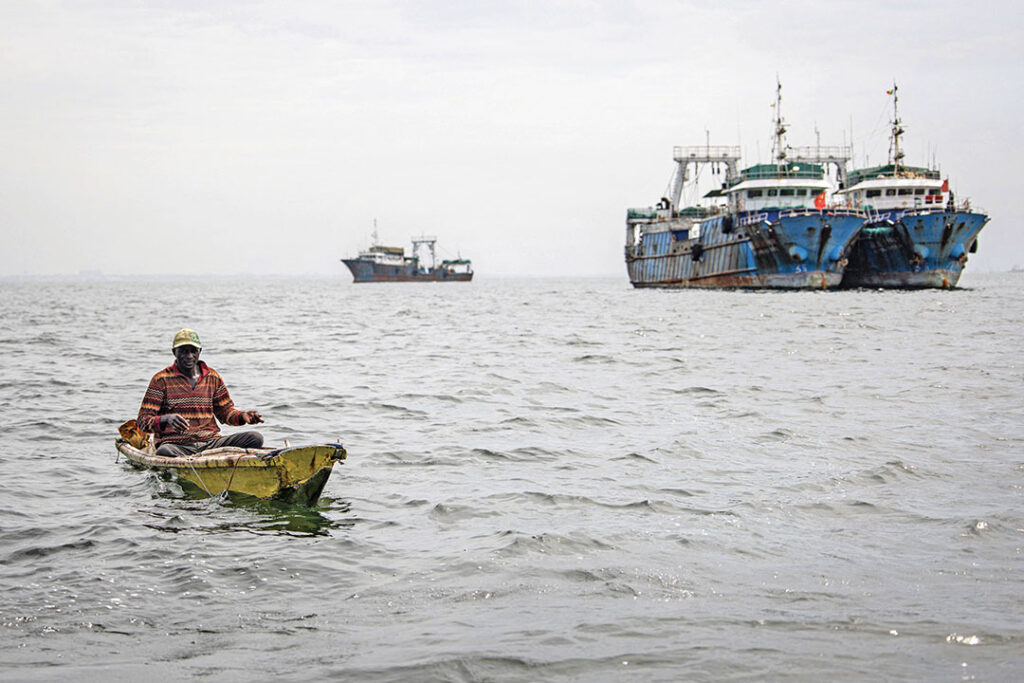Africa loses an estimated $11.2 billion in annual revenue to illegal, unreported and unregulated (IUU) fishing. The challenge is particularly acute in West Africa, which loses up to $9.4 billion to the scourge.
Illegal fishing by foreign industrial and semi-industrial trawlers, particularly from China, has driven food insecurity and threatened the jobs of more than 10 million men and women who work in Africa’s artisanal fisheries.
Security professionals recognize the threat. Col. Roland T. Bai Murphy, commander of the 23rd Infantry Brigade of the Armed Forces of Liberia, has seen firsthand the effects of IUU fishing on his country’s artisanal fishermen. Liberia loses $75 million annually to illegal fishing.
“IUU is serious, because most of our population that lives along the coastal lands are artisanal fishermen,” Murphy told ADF during the African Land Forces Summit in Accra, Ghana, in April 2025. “So, when you have these trawlers coming in from Asian countries and some European countries fishing aggressively in our waters illegally, it denies the local artisanal fishermen their livelihood.”

In Liberia, about 37,000 people work full or part time in the fishing industry, and 80% of the population relies on fish for protein. But industrial “supertrawlers” are putting this way of life at risk, displacing artisanal fishermen and decimating the ocean ecosystem.
“You have these big trawlers, some of them have nets that are a mile long, and they are dragging these sea beds, even damaging the coral reefs so badly that in Liberia you started having coral reefs washed ashore,” Murphy said.
Several nations in the Gulf of Guinea implemented a patchwork of initiatives to combat illegal fishing, but they often go unenforced and unintegrated due to weak governance, limited enforcement resources and corruption.
Gareth Johnstone is executive director of Trygg Mat Tracking (TMT), a nonprofit organization that provides fisheries intelligence to countries and organizations. He contends that regional cooperation and collaboration are imperative in the fight against illegal fishing.
“It’s a simple approach of coming together,” Johnstone told ADF. “That means you start to share information. You start to share resources. Therefore, you have more eyes on the problem. This also increases transparency. You can see what’s on your [country’s fishing] license list, so when vessels are apprehended, we can see if they’re legally licensed or not. Going regional is really a no-brainer.”
There are moves in that direction. In 2022, the Fisheries Committee for the West Central Gulf of Guinea and the Sub-Regional Fisheries Commission signed a memorandum of understanding with the Economic Community of West African States that established a framework for collaboration, partnership and cooperation.
Through this framework, the Regional Monitoring, Control and Surveillance Centre in Tema, Ghana, is part of an effort to combat illegal fishing, improve oversight of fishing and fisheries enforcement, increase information sharing, and reduce costs for member states. TMT helps the center identify illegal fishing vessels, track their activities and analyze their connections to other crimes.

The Nova Zeelandia Case
Officials in Tema demonstrated the value of successful intelligence sharing and cross-border collaboration in March 2023 when the Dutch-owned Nova Zeelandia entered the port. There were no immediate indicators that the vessel operated illegally, but a retrospective monitoring, control and surveillance assessment identified gaps in the ship’s use of its automatic identification system, a practice known as going dark. Boats often do this to conceal illegal operations.
An investigation revealed that the ship had operated with Cameroon-flagged donor vessels to illegally transship fish at sea. Cameroon is a flag state sanctioned by the European Union for fishing violations. Upon review, Ghana contacted Angola via the South African Development Community’s (SADC) Monitoring, Control and Surveillance Coordination Centre and confirmed that the ship also had illegally transshipped fish at sea, a practice known as saiko, along with the four other vessels. The Nova Zeelandia’s documents also were forged.
Throughout the investigation, the West Africa Task Force regional communications platform arranged real-time collaboration with Angola, Benin, Côte d’Ivoire and Ghana, all areas through which the ship sailed. This led to Angola opening a legal case against Nova Zeelandia and the other vessels involved in saiko. In 2024, the Nova Zeelandia was denied further operations in Angola. Cameroon fined each vessel owner for noncompliance with national fisheries laws.
“The Nova Zeelandia case serves as a model for future multi-regional enforcement efforts, showcasing how robust PSMA [Agreement on Port State Measures] implementation and intelligence-driven enforcement can shut down IUU fishing networks,” Johnstone wrote in a TMT report.

Protecting Southern African Waters
Within the SADC, Madagascar is viewed as a promoter of transparency and regional cooperation in efforts to fight sea crimes and enhance the blue economy. Madagascar’s Regional Maritime Information Fusion Center helps identify suspicious vessels. Constant monitoring by the center’s watch room helps it warn regional maritime law enforcement agencies of threats in a timely manner.
The Madagascar center shares information with its sister operation, the Regional Centre for Operational Coordination in the Seychelles, and with any country that faces a maritime threat. The Seychelles center mainly conducts joint law enforcement actions at sea.
Analysts have recommended that all countries in the region join the architecture of the Maritime Security Program so they can receive information from the regional centers. Comoros, Djibouti, France on behalf of Réunion island, Kenya, Madagascar, Mauritius, the Seychelles and Tanzania are current program members.

In April 2025, the SADC’s Monitoring, Control and Surveillance Coordination Centre; Madagascar’s center; Stop Illegal Fishing; TMT; the World Wildlife Fund; and Fitsinjo, a local IUU fishing observatory; engaged in a four day workshop aimed at establishing a regional fishing vessel registry. They introduced fisheries inspectors from six ports in Madagascar to tools and methodology promoted through the SADC center to assess risks of fishing vessels and strengthen decision-making processes to deal with suspicious activities.
In August 2024, Madagascar unveiled a five-year plan to implement fishing quotas, create marine protected areas and diversify income sources for fishing communities.
“By building the capacity of fishermen through training and education, we aim to ensure that small-scale fishing remains a viable and sustainable activity for future generations,” Paubert Mahatante, Madagascar’s minister for fisheries and the blue economy, told SeafoodSource.
China’s Malign Methods
China, which commands the world’s largest distant-water fishing fleet, has the world’s worst illegal fishing record, according to the IUU Fishing Risk Index. Of the top 10 companies engaged in illegal fishing globally, eight are from China. Beijing’s trawlers can catch five times as many fish in a day as a small village fleet can in a year.
Chinese trawlers are notorious for “flagging in” to African nations, meaning they use and abuse local rules to flag a foreign-owned and -operated fishing vessel into an African registry to fish in local waters. Flagging in is a common sign that vessels are fishing illegally. Among the most destructive illegal fishing methods practiced by China’s fleet is bottom trawling. Around Africa, China’s bottom trawl fleet catches an estimated 2.35 million tons of fish a year worth more than $5 billion, according to the Environmental Justice Foundation. Besides robbing the continent of food and income, bottom trawling wrecks ecosystems that fish need to survive and indiscriminately catches all manner of marine life.
Other illegal methods employed by Chinese trawlers include fishing with explosives, fishing with powerful lights at night, fishing in prohibited areas such as a country’s exclusive economic zone, and engaging in “saiko,” the illegal transshipment of fish at sea. In saiko, catches are transferred from a trawler to a large canoe capable of carrying about 450 times more fish than an artisanal fishing canoe. Beijing’s trawlers also are known to destroy fishing gear used by local fishermen and capsize their canoes, sometimes resulting in deaths.
In April 2025, Ghana’s Ministry of Fisheries and Aquaculture and the Fisheries Commission suspended for 12 months the fishing licenses of four Chinese trawlers for practicing saiko, dumping unwanted fish, fishing in restricted zones and harvesting juvenile fish. IUU fishing costs the country between $14.4 million and $23.7 million annually.
“Saiko is precipitating the collapse of Ghana’s staple fish stock and with it, poverty and hunger for its people,” Steve Trent, executive director of the Environmental Justice Foundation, said in a Dialogue Earth report. “Chinese trawlers are making millions of dollars in an illegal trade which makes up over half of the fish caught by industrial boats in Ghana.”
The trawlers, Meng Xin 10, Florence 2, Long Xiang 607 and Long Xiang 608, were flagged to Ghana but are owned by three Chinese companies, Ghana Business News reported.
The Meng Xin fleet, owned by the Dalian Mengxin Ocean Fishery Co., is linked to the 2019 disappearance of Ghanaian fisheries observer Emmanuel Essien. He went missing from the Meng Xin 15 trawler after filming the crew illegally discarding fish at sea and filing a report with the country’s Fisheries Commission. He has never
been found.
By the Numbers
Illegal fishing has robbed the continent of revenue, threatened the livelihoods of millions of workers and driven food insecurity for decades. These numbers illustrate the scale of the problem:
- The continent loses $11.2 BILLION annually due to illegal fishing.
- $9.4 billion is lost in West Africa alone due to illegal fishing.
- 40% of the world’s illegal trawlers fish in West Africa.
- 7 million people in West Africa depend on fish for food and employment.
- In Côte d’Ivoire, the yearly overall catch plummeted almost 40% between 2003 and 2020, due largely to illegal fishing.
- The maximum catch potential for Côte d’Ivoire, Ghana and Nigeria could drop by about 50% by mid-century.
- In Ghana, total landings of small pelagic fish, a staple of the national diet, fell by 59% between 1993 and 2019.
- Of the top 10 companies engaged in illegal fishing globally, eight are from China.
- China’s bottom trawl fleet catches an estimated 2.35 million tons of fish annually around the continent worth more than $5 billion.

